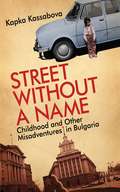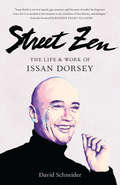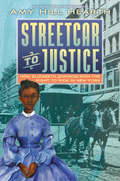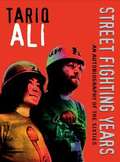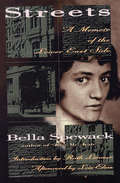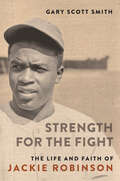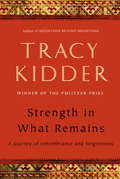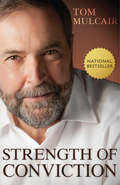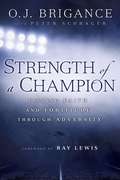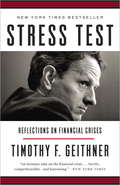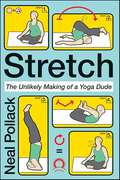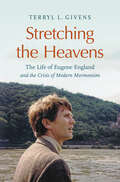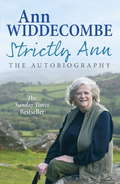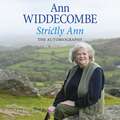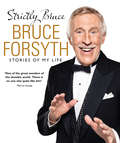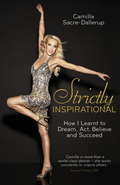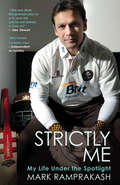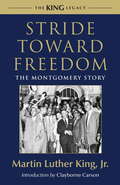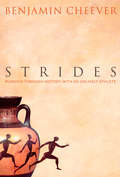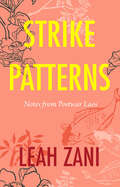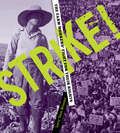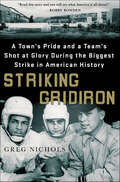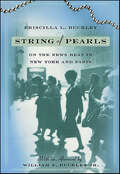- Table View
- List View
Street Without a Name: Childhood and Other Misadventures in Bulgaria
by Kapka KassabovaKassabova was born in Sofia, Bulgaria and grew up under the drab, muddy, grey mantle of one of communism's most mindlessly authoritarian regimes. Escaping with her family as soon as possible after the collapse of the Berlin Wall, she lived in Britain, New Zealand, and Argentina, and several other places. But when Bulgaria was formally inducted to the European Union she decided it was time to return to the home she had spent most of her life trying to escape. What she found was a country languishing under the strain of transition. This two-part memoir of Kapka's childhood and return explains life on the other side of the Iron Curtain.
Street Zen: The Life and Work of Issan Dorsey
by David SchneiderDrag queen. Prostitute. Drug addict. American bodhisattva.These words describe the unlikely persona of Issan Dorsey, one of the most beloved teachers to emerge in American Zen. From his early days as a gorgeous female impersonator to the LSD experiences that set him on the spiritual path, Issan's life was never conventional. In 1989, after twenty years of Zen practice, he became the Founding Abbot of San Francisco's Hartford Street Zen Center, where he established Maitri Hospice for AIDS patients. Featuring Bernie Glassman's foreword to the second edition, as well as a new foreword by Koshin Paley Ellison, Street Zen paints a vivid portrait of a teacher whose creativity, honesty, joy, and compassion awakened new possibilities for American Buddhism.
Streetcar to Justice: How Elizabeth Jennings Won the Right to Ride in New York
by Amy Hill HearthBestselling author and journalist Amy Hill Hearth uncovers the story of a little-known figure in U.S. history in this fascinating biography. In 1854, a young African American woman named Elizabeth Jennings won a major victory against a New York City streetcar company, a first step in the process of desegregating public transportation in Manhattan.This illuminating and important piece of the history of the fight for equal rights, illustrated with photographs and archival material from the period, will engage fans of Phillip Hoose’s Claudette Colvin and Steve Sheinkin’s Most Dangerous.One hundred years before Rosa Parks refused to give up her seat on a bus in Montgomery, Alabama, Elizabeth Jennings’s refusal to leave a segregated streetcar in the Five Points neighborhood of Manhattan set into motion a major court case in New York City.On her way to church one day in July 1854, Elizabeth Jennings was refused a seat on a streetcar. When she took her seat anyway, she was bodily removed by the conductor and a nearby police officer and returned home bruised and injured. With the support of her family, the African American abolitionist community of New York, and Frederick Douglass, Elizabeth Jennings took her case to court. Represented by a young lawyer named Chester A. Arthur (a future president of the United States) she was victorious, marking a major victory in the fight to desegregate New York City’s public transportation. Amy Hill Hearth, bestselling author of Having Our Say: The Delany Sisters’ First 100 Years, illuminates a lesser-known benchmark in the struggle for equality in the United States, while painting a vivid picture of the diverse Five Points neighborhood of Manhattan in the mid-1800s.Includes sidebars, extensive illustrative material, notes, and an index.
Streetfighting Years: An Autobiography of the Sixties
by Tariq AliAfter his 1963 move to Britain, having initially been introduced to leftist politics as a student in Pakistan, Ali (now an editor of New Left Review) threw himself into the tumultuous radical politics of the 1960s. In this memoir of those years, he describes organizing protests against the Vietnam War and other imperialist adventures, discusses the reaction to the Paris student uprisings of 1968, and assesses the achievements of the New Left movements up to 1975, among other topics. This new edition adds a new introduction by Ali, in which he relates themes in the memoir to more recent politics, as well as an interview conducted by Ali and Robin Blackburn with John Lennon as he was become increasingly politically radicalized.
Streets: A Memoir of the Lower East Side (The\helen Rose Scheuer Jewish Women's Ser.)
by Bella Spewack&“A startling, clear-eyed&” memoir of an immigrant girl&’s childhood in early 20th century NYC from the journalist and Tony-winning co-author of Kiss Me Kate (Booklist). Born in Transylvania in 1899, Bella Spewack arrived on the streets of New York&’s Lower East Side when she was three. At twenty-two, while working as a reporter with her husband in Europe, she wrote a memoir of her childhood that was never published. More than seventy years later, the publication of Streets recovers a remarkable voice and offers a vivid chronicle of a lost world. Bella, who went on to a brilliant career write for stage and screen with her husband Sam, describes the sights, sounds, and characters of urban Jewish immigrant life after the turn of the century. Witty, street-smart, and unsentimental, Bella was a genuine American heroine who displays in this memoir &“a triumph of will and spirit&” (The Jewish Week).
Streisand: A Biography
by Anne EdwardsStreisand: A Biography is much more than the story of the world's greatest living performer, how she got there, and why she remains at the top after three decades, it is also, in Anne Edward's sure hands, a compelling chronicle of a woman's fight to validate her appearance, her talent, and her right to love and be loved. Time and time again Streisand has demonstrated the ability to reinvent herself to keep pace with the continuing changes in musical taste. This updated edition of Edwards's pioneering biography chronicles her public life as a political activist as well as her private life as Mrs. James Brolin.
Strength for the Fight: The Life and Faith of Jackie Robinson (Library of Religious Biography (LRB))
by Gary Scott SmithHow faith sustained Jackie Robinson—both as an athlete and as an activist. The integration of Major League Baseball in 1947 was a triumph. But it was also a fight. As the first Black major leaguer since the 1880s, Jackie Robinson knew he was not going to be welcomed into America&’s pastime with open arms. Anticipating hostility, he promised Brooklyn Dodgers general manager Branch Rickey that he would &“turn the other cheek&” during his first years in the league, despite his fiercely competitive disposition. Robinson later said that his faith in God had sustained him—giving him the strength he needed to play the game he loved at the highest level without retaliating against the abuse inflicted upon him by opposing players and fans. Faith was a key component of Robinson&’s life, but not in the way we see it with many prominent Christian athletes today. Whereas the Tim Tebows and Clayton Kershaws of the sports world emphasize personal spirituality, Robinson found inspiration in the Bible&’s teachings on human dignity and social justice. He grew up a devout Methodist (a heritage he shared with Branch Rickey) and identified with the theological convictions and social concerns of many of his fellow mainline Protestants—especially those of the Black church. While he humbly stated that he could not claim to be a deeply religious man, he spoke frequently in African American congregations and described a special affinity he and other Black Christians felt for the biblical character Job, who had also kept faith despite suffering and injustice. In his eulogy for Robinson, Jesse Jackson described Robinson as a &“co-partner of God,&” who lived out his faith in his civil rights activism, both during and after his baseball career. Robinson&’s faith will resonate with many Christians who believe, as he did, that &“a person can be quite religious and at the same time militant in the defense of his ideals.&” This religious biography of Robinson chronicles the important role of faith in his life, from his childhood to his groundbreaking baseball career through his transformative civil rights work, and, in the process, helps to humanize the man who has become a mythic figure in both sports history and American culture.
Strength in What Remains: A Journey Of Remembrance And Forgiveness (Random House Reader's Circle Ser.)
by Tracy KidderStrength in What Remains recounts the remarkable experiences of Deo, a medical student from Burundi who narrowly survived two genocides, first in his own country, then Rwanda. Through sheer fortitude, and the astonishing kindness of strangers, Deo fled to New York. But his ordeal was far from over. He endured daily discrimination in his menial job, and left his first home - a Harlem tenement building - for the greater safety of sleeping rough in Central Park. Again the generosity of those he encountered prevailed. Deo was introduced to a couple who would in time virtually adopt him, and in the coming years he graduated from Colombia, obtained US citizenship and returned to Burundi to pursue his dream of founding a clinic. In this powerful book, Tracy Kidder brings to light the universality of the human condition through Deo's extraordinary story of suffering and survival.
Strength of Conviction
by Tom MulcairGlobe & Mail Non-Fiction Bestseller Toronto Star Non-Fiction Bestseller The inside story of Tom Mulcair’s rise from modest, middle-class beginnings to the threshold of power. He has been called the strongest Opposition leader in the television era; he was also known in Québec as the provincial Opposition’s “pit bull.” Here, in his own words, and for the first time, is the inside story of Tom Mulcair’s rise from modest, middle-class beginnings to the threshold of power. Discover the man behind the headlines: who he is, how he thinks, and how he comes by the values that shaped his character. Unwavering in his convictions, he shares behind-the-scenes information on the reasons why he resigned as Québec’s minister of the environment under Charest; his decision to rejoin the New Democratic Party; and what it was like working closely with Jack Layton to help spearhead the “Orange Wave” that swept the NDP into power as the Official Opposition in the 2011 federal election. Alongside this, Mulcair also sheds light on such nation-defining events as past immigration and environmental policies, the Québec Referendum, Native residential schools and the Truth and Reconciliation Commission, and the Harper government’s Anti-Terrorism Act. In this book, Mulcair reveals his vision for the country, and his position on the issues that matter most — making Strength of Conviction an essential read for all Canadians with an interest in our nation’s future.
Strength of a Champion
by O. J. BriganceAs the Baltimore Ravens made their improbable march to victory in Super Bowl XLVII, they turned to their senior advisor of player development, O. J. Brigance, for inspiration each and every Sunday. Following a stellar twelve-year career as a linebacker, including a Super Bowl win with Baltimore in 2000, O. J. "Juice” Brigance joined the Ravens’ front office. But in 2007, O. J. was diagnosed with amyotrophic lateral sclerosis-also known as Lou Gehrig’s disease-and told he had only three to five years to live. As a player, he’d battled hundreds of injuries and setbacks. None of them prepared him to face ALS. With faith and determination in his heart and his wife, Chanda, praying by his side, O. J. fought back against the debilitating disease, even as ALS robbed him of the ability to walk and speak. He kept working, smiling, and touching his players’ lives all the way through their remarkable Super Bowl run-more than five years after his diagnosis. Now, O. J. shares his incredible story, offering lessons in resilience and reflecting on the championship team that inspired him in turn. Along with his own journey, O. J. recounts the struggles and successes of Ravens players, including Ray Lewis, Joe Flacco, and Torrey Smith, as well as the strength of head coach John Harbaugh. Having watched their season from the best seat in the house, O. J. highlights their perseverance, confidence, and leadership, and the best that sports can bring out in people. Full of profound revelations and never-before-told anecdotes, Strength of a Champion is a celebration of the human spirit from a man who left everything on the field. O. J. Brigance never asked to be a hero. That’s what makes his story so courageous. .
Stress Test
by Timothy F. GeithnerStress Test is the story of Tim Geithner's education in financial crises. As president of the Federal Reserve Bank of New York and then as President Barack Obama's secretary of the Treasury, Timothy F. Geithner helped the United States navigate the worst financial crisis since the Great Depression, from boom to bust to rescue to recovery. In a candid, riveting, and historically illuminating memoir, he takes readers behind the scenes of the crisis, explaining the hard choices and politically unpalatable decisions he made to repair a broken financial system and prevent the collapse of the Main Street economy. This is the inside story of how a small group of policy makers--in a thick fog of uncertainty, with unimaginably high stakes--helped avoid a second depression but lost the American people doing it. Stress Test is also a valuable guide to how governments can better manage financial crises, because this one won't be the last. Stress Test reveals a side of Secretary Geithner the public has never seen, starting with his childhood as an American abroad. He recounts his early days as a young Treasury official helping to fight the international financial crises of the 1990s, then describes what he saw, what he did, and what he missed at the New York Fed before the Wall Street boom went bust. He takes readers inside the room as the crisis began, intensified, and burned out of control, discussing the most controversial episodes of his tenures at the New York Fed and the Treasury, including the rescue of Bear Stearns; the harrowing weekend when Lehman Brothers failed; the searing crucible of the AIG rescue as well as the furor over the firm's lavish bonuses; the battles inside the Obama administration over his widely criticized but ultimately successful plan to end the crisis; and the bracing fight for the most sweeping financial reforms in more than seventy years. Secretary Geithner also describes the aftershocks of the crisis, including the administration's efforts to address high unemployment, a series of brutal political battles over deficits and debt, and the drama over Europe's repeated flirtations with the economic abyss. Secretary Geithner is not a politician, but he has things to say about politics--the silliness, the nastiness, the toll it took on his family. But in the end, Stress Test is a hopeful story about public service. In this revealing memoir, Tim Geithner explains how America withstood the ultimate stress test of its political and financial systems.From the Hardcover edition.
Stretch: The Unlikely Making of a Yoga Dude
by Neal PollackFrom Neal Pollack, acclaimed author of Alternadad and The Neal Pollack Anthology of American Literature, comes Stretch: The Unlikely Making of a Yoga Dude. Here is the hilarious but true account of an overweight, balding, skeptical guy who undergoes a miraculous transformation into a healthy, blissful, obsessively dedicated yoga fiend.
Stretching the Heavens: The Life of Eugene England and the Crisis of Modern Mormonism
by Terryl L. GivensEugene England (1933–2001)—one of the most influential and controversial intellectuals in modern Mormonism—lived in the crossfire between religious tradition and reform. This first serious biography, by leading historian Terryl L. Givens, shimmers with the personal tensions felt deeply by England during the turmoil of the late twentieth century. Drawing on unprecedented access to England's personal papers, Givens paints a multifaceted portrait of a devout Latter-day Saint whose precarious position on the edge of church hierarchy was instrumental to his ability to shape the study of modern Mormonism. A professor of literature at Brigham Young University, England also taught in the Church Educational System. And yet from the sixties on, he set church leaders' teeth on edge as he protested the Vietnam War, decried institutional racism and sexism, and supported Poland's Solidarity movement—all at a time when Latter-day Saints were ultra-patriotic and banned Black ordination. England could also be intemperate, proud of his own rectitude, and neglectful of political realities and relationships, and he was eventually forced from his academic position. His last days, as he suffered from brain cancer, were marked by a spiritual agony that church leaders were unable to help him resolve.
Strictly Ann: The Autobiography
by Ann WiddecombeWith characteristic verve and integrity, Ann Widdecombe recalls her life and highlights the people and events that most influenced her along the way.From her early family life in Singapore and her convent school days to her student ambitions at Birmingham and Oxford, and her long-serving years as an MP, this is the life story of one of our most outspoken and celebrated politicians. Offering unique insight into her time as a Minister in three Departments and the Shadow Cabinet in the 1990s, Ann also explains the roots of her conversion to Catholicism in 1993 and her deeply held views on abortion and gay marriage.A rare anti-hunting Tory, who campaigned for prison education and once put on a miner's overalls to go down a coal mine, Ann Widdecombe has never been afraid of controversy. Her memoirs reveal a singular personality who lives life to the full. From feisty and witty appearances on Have I Got News For You to her unforgettable and star-turning performances on Strictly Come Dancing, Ann has earned her place in the public's affections and has been heralded as a 'national living treasure' by the Guardian.Also containing Ann's trenchant views on the Coalition, MPs' expenses and the state of the nation, this is a provocative and entertaining read. Frank, fearless and engaging, Ann's autobiography will delight her admirers and win her yet more fans.
Strictly Ann: The Autobiography
by Ann WiddecombeForthright memoirs of a singular personality - former MP and Strictly Come Dancing star, Ann Widdecombe.In this life story of one of our most outspoken and celebrated politicians, Ann Widdecombe offers a unique insight into her time as a minister in three government departments and the Shadow Cabinet in the 1990s, as well as taking us back to her wandering childhood and explaining the roots of her deeply held views.A rare anti-hunting Tory, who campaigned for prison education and once donned a miner's overalls to go down a coal mine, Ann Widdecombe has never shied away from controversy. Her memoirs reveal a singular personality who lives life to the full. From feisty appearances on Have I Got News for You to her unforgettable and star-turning performances on Strictly Come Dancing, Ann has earned her place in the public's affections and has been heralded as a 'national living treasure' by the Guardian.
Strictly Ann: The Autobiography
by Ann WiddecombeWith characteristic verve and integrity, Ann Widdecombe recalls her life and highlights the people and events that most influenced her along the way. From her early family life in Singapore and her convent school days to her student ambitions at Birmingham and Oxford, and her long-serving years as an MP, this is the life story of one of our most outspoken and celebrated politicians. Offering unique insight into her time as a Minister in three Departments and the Shadow Cabinet in the 1990s, Ann also explains the roots of her conversion to Catholicism in 1993 and her deeply held views on abortion and gay marriage. A rare anti-hunting Tory, who campaigned for prison education and once put on a miner's overalls to go down a coal mine, Ann Widdecombe has never been afraid of controversy. Her memoirs reveal a singular personality who lives life to the full. From feisty and witty appearances on Have I Got News For You to her unforgettable and star-turning performances on Strictly Come Dancing, Ann has earned her place in the public's affections and has been heralded as a 'national living treasure' by the Guardian. Also containing Ann's trenchant views on the Coalition, MPs' expenses and the state of the nation, this is a provocative and entertaining read. Frank, fearless and engaging, Ann's autobiography will delight her admirers and win her yet more fans.Read by Jilly Bond
Strictly Bruce: Stories Of My Life
by Bruce ForsythBruce Forsyth, the consummate performer and much-loved face of British entertainment, shares his story of a remarkable life lived to the full. A dancer, comedian, singer, actor, musician and all-round entertainer, Bruce achieved national recognition as the host of Sunday Night at the London Palladium in the 1950s. With his classic one-man shows, appearances alongside some of the world’s greatest performers, and hugely popular TV shows ranging from The Generation Game to Strictly Come Dancing, he was a household name renowned for putting a smile on the nation’s face.Charting his life story from talented young lad growing up in north London to achieving national treasure status, Strictly Bruce is full of warm anecdotes spanning over eight decades of Bruce’s life, man and boy. It’s a chance to take a trip down memory lane, celebrate the golden age of British showbiz and step behind the scenes of Bruce’s personal life, meeting the people he loved and learning what made him tick.
Strictly Inspirational
by Camilla Sacre-DallerupCamilla Dallerup found fame and heartbreak as a dancer on Strictly Come Dancing, winning her way into British hearts as one of the original cast of professional dancers on the BBC programme, and which culminated in winning the coveted Strictly trophy with actor Tom Chambers. In this candid autobiography, Camilla shares the practical, motivational techniques she has used both personally and professionally to achieve success and happiness.
Strictly Me: My Life Under the Spotlight
by Mark RamprakashMark Ramprakash is arguably the greatest English batsman of his generation, but he is also an enigma. He is among an elite group of players who have scored 100 first-class centuries, yet has never flourished as he should have done at Test level. To many people in the UK, he is just as well known for his exploits on the dance floor: he won Strictly Come Dancing in 2006 and went on to win the Champion of Champions final in 2008 for Sport Relief.In Strictly Me, Ramprakash covers in detail all aspects of his cricket career - from the hot-headed cricketing prodigy who made his Test debut for England at the age of 21 to finally being cast aside by his country in 2002. He discusses how he has become one of the UK's best celebrity dancers and how his newfound status as a media celebrity has flourished since then.
Stride Toward Freedom: The Montgomery Story (King Legacy #1)
by Martin Luther King Jr.Dr. Martin Luther King, Jr.'s account of the first successful large-scale application of nonviolent resistance in America is comprehensive, revelatory, and intimate. King described his book as "the chronicle of 50,000 Negroes who took to heart the principles of nonviolence, who learned to fight for their rights with the weapon of love, and who, in the process, acquired a new estimate of their own human worth." It traces the phenomenal journey of a community, and shows how the twenty-six-year-old King, with his conviction for equality and nonviolence, helped transform the nation and the world.
Strides: Running Through History With an Unlikely Athlete
by Benjamin CheeverAcclaimed novelist Benjamin Cheever--author of The Plagiarist, Famous After Death, and The Good Nanny--brings his buoyant literary style to this impassioned memoir about the sport that changed his life.From Pheidippides, who ran the first marathon in 490 BC--bringing news to Athens of the Greek victory on the plains of Marathon--to our own soldiers in Iraq today, running is an integral part of human culture and legend. In Strides, heralded author Benjamin Cheever explores the role of running in human history while interspersing this account with revelations of his own decades-long devotion to the sport.Cheever has traveled the world writing features for Runner's World magazine, and he draws from this rich experience on every page. His adventures have taken him to Kenya in search of the secrets of the world's fastest long-distance runners and to a 10-K race with American soldiers in Baghdad. Cheever celebrates the quotidian personal satisfaction of a morning run and the more exotic pleasures of the Medoc Marathon in Bordeaux, where fine wines are served at water stations and the first prize is the winner's weight in grand crus. He shares vivid moments from the New York Marathon and waxes rhapsodic about the granddaddy of American distance events--the Boston Marathon. But what truly distinguishes Strides as a memorable read is the unique lens through which this sparkling writer explores our deep bond to running, an experience he likens to that of being able to fly.
Strike Patterns: Notes from Postwar Laos
by Leah ZaniA strike pattern is a signature of violence carved into the land—bomb craters or fragments of explosives left behind, forgotten. In Strike Patterns, poet and anthropologist Leah Zani journeys to a Lao river community where people live alongside such relics of a secret war. With sensitive and arresting prose, Zani reveals the layered realities that settle atop one another in Laos—from its French colonial history to today's authoritarian state—all blown open by the war. This excavation of postwar life's balance between the mundane, the terrifying, and the extraordinary propels Zani to confront her own explosive past. From 1964 to 1973, the United States carried out a covert air war against Laos. Frequently overshadowed by the war with Vietnam, the Secret War was the longest and most intense air war in history. As Zani uncovers this hidden legacy, she finds herself immersed in the lives of her hosts: Chantha, a daughter of war refugees who grapples with her place in a future Laos of imagined prosperity; Channarong, a bomb technician whose Thai origins allow him to stand apart from the battlefields he clears; and Bounmi, a young man who has inherited his bomb expertise from his father but now struggles to imagine a similar future for his unborn son. Wandering through their lives are the restless ghosts of kin and strangers. Today, much of Laos remains contaminated with dangerous leftover explosives. Despite its obscurity, the Secret War has become a shadow model for modern counterinsurgency. Investigating these shadows of war, Zani spends time with silk weavers and rice farmers, bomb clearance crews and black market war scrap traders, ritual healers and survivors of explosions. Combining her fieldnotes with poetry, fiction, and memoir she reflects on the power of building new lives in the ruins.
Strike!: The Farm Workers' Fight for Their Rights
by Larry Dane BrimnerIn 1965, as the grapes in California's Coachella Valley were ready to harvest, migrant Filipino American workers--who picked and readied the crop for shipping--negotiated a wage of $1.40 per hour, the same wage growers had agreed to pay guest workers from Mexico. But when the Filipino grape pickers moved north to Delano, in the Central Valley, and again asked for $1.40 an hour, the growers refused. The ensuing conflict set off one of the longest and most successful strikes in American history. In Strike!, award-winning author Larry Dane Brimner dramatically captures that story. Brimner, a master researcher, fills this riveting account of the strike and its aftermath with the words of migrant workers, union organizers, and grape growers, as well as archival images that capture that first strike in 1965 and the ones that subsequently followed. Includes an author's note, bibliography, and source notes.
Striking Gridiron: A Town's Pride and a Team's Shot at Glory During the Biggest Strike in American History
by Greg NicholsIn the midst of a strike and economic uncertainty, a football team from an iconic steel town just outside Pittsburgh set out to capture its sixth straight season without a loss, uniting a region and inspiring the nation.In the summer of 1959, most of the town of Braddock, Pennsylvania--along with half a million steel workers around the country--went on strike in the longest labor stoppage in American history. With no paychecks coming in, the families of Braddock looked to its football team for inspiration.The Braddock Tigers had played for five amazing seasons, a total of 45 games, without a single loss. Heading into the fall of ‘59, this team from just outside Pittsburgh, whose games members of the Steelers would drop by to watch, needed just eight victories to break the national record for consecutive wins. Sports Illustrated and other media descended upon the banks of the Monongahela River to profile the team and its revered head coach, future Hall of Famer Chuck Klausing, who molded his boys into winners while helping to effect the racial integration of his squad. While the townspeople bet their last dollars on the Tigers, young black players like Ray Henderson hoped that the record would be a ticket to college and spare them from life in the mills alongside their fathers. In Striking Gridiron, author Greg Nichols recounts every detail of Braddock's incredible sixth, undefeated season--from the brutal weeks of summer training camp to the season's final play that defined the team's legacy. In the words of Klausing himself, "Greg Nichols couldn't have written it better if he'd been on the sidelines with us."But even more than the story of a triumphant season, Nichols's narrative is an intimate chronicle of small-town America during the hardest of times. Striking Gridiron takes us from the sidelines and stands on game day into the school hallways, onto the street corners, and into the very homes of Braddock to reveal a beleaguered blue-collar town from a bygone era--and the striking workers whose strength was mirrored by the football heroics of steel-town boys on Friday nights and Saturday afternoons.
String of Pearls: On the News Beat in New York and Paris
by Priscilla L. BuckleyPriscilla Buckley is probably known for her long and admired tenure as managing editor of the conservative political journal National Review, founded in the 1950s by her brother William F. Buckley Jr. But in String of Pearls we meet a different Priscilla--young Pitts Buckley, just out of Smith, eager for the next step up from the college paper to "real" journalism. There she is, in her proper wool suit, her cashmere sweater, and in her string of pearls, notebook at the ready, United Press Radio News Department's fledgling employee.The war in Europe was winding to its close. For Buckley, the atmosphere in UP's New York offices was a heady one; the journalists worked furiously but had time to play practical jokes, stage mock battles on the newsroom floor, and treasure the funny stories that haste and tension engender. Young Priscilla fit right in; she made friends, wrote copy for the reporters to read on the air ("Keep the sentences short!"), and joined in the fun and frequent hilarity. It was a demanding, sometimes heartbreaking, and always vibrant period.The author was pleased a few years later to be offered a job at the Paris bureau of United Press. the young writer who has spent some of her girlhood years living in prewar France with her parents and her numerous siblings found a different Paris a war's end: scars of the prolonged occupation were everywhere. It was a poignant time, but for Priscilla and her friends there was laughter and comic misadventures as well, and she shares them, along with varied characters gathered at United Press at the time, with us.Buckley's stay in Paris was cut short by a summons from brother Bill: Would she be interested in working with him on the new magazine he was starting? Thus ended her UP days, and this began a new and glowing journalistic career.String of Pearls, which includes charming illustrations by the author's niece Lee Buckley, and an Afterword by her brother William F. Buckley Jr., is a knowing and delightful look at a turbulent time in a turbulent world.
